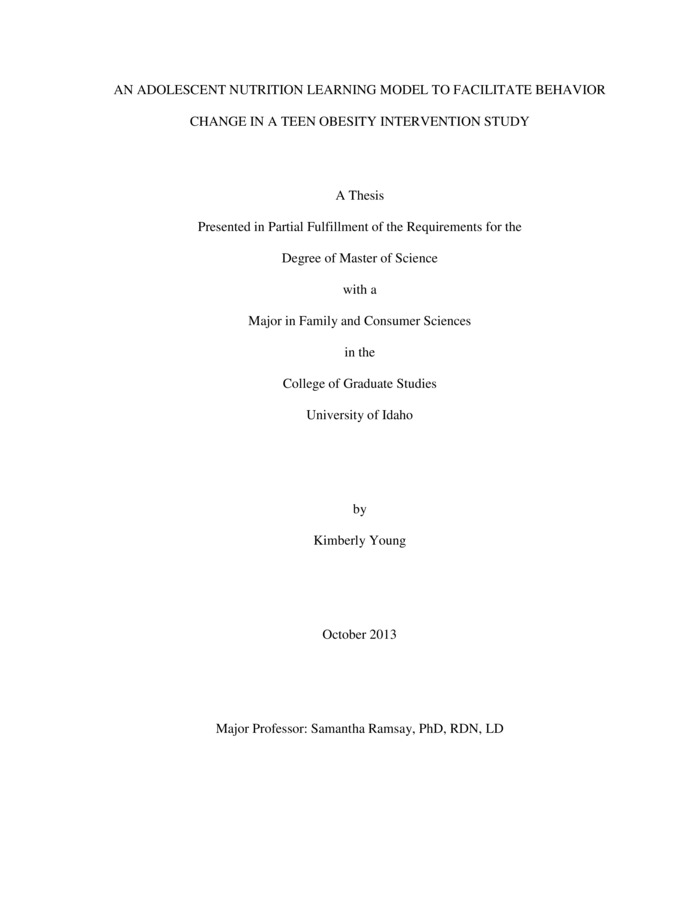Please note: this collection is no longer updated. Visit our Theses and Dissertations Collection in VERSO for all U of I ETD since 2012.
ETD PDF
An Adolescent Nutrition Learning Model to Facilitate Behavior Change in a Teen Obesity Intervention Study
Citation
Young, Kimberly. (2013). An Adolescent Nutrition Learning Model to Facilitate Behavior Change in a Teen Obesity Intervention Study. Theses and Dissertations Collection, University of Idaho Library Digital Collections. https://www.lib.uidaho.edu/digital/etd/items/etd_399.html
- Title:
- An Adolescent Nutrition Learning Model to Facilitate Behavior Change in a Teen Obesity Intervention Study
- Author:
- Young, Kimberly
- Date:
- 2013
- Keywords:
- Adolescents behavior change dietitian intervention Nutrition obesity Nutrition
- Program:
- Family and Consumer Sciences
- Abstract:
- Adolescent obesity increases the risk for adult obesity and morbidity. Registered dietitians nutritionists (RDNs) are involved in adolescent obesity interventions intended to reverse or decrease immediate and long term complications. Qualitative methodology was used to identify perceived usefulness of RDNs to change adolescent nutrition behaviors in an obesity intervention study: Wellness Incentive to Health (WITH) program. Ten participants (adolescents between 15-17 years of age, 2 males and 8 females) were interviewed. A questionnaire guide was developed to ask participants about their knowledge of RDNs, the benefits of having RDNs in the program, and what they learned from RDNs. Participant interviews lasted approximately 30 minutes, were audio-recorded, and transcribed. Audio transcriptions were systematically coded and analyzed to identify central themes. Nine of ten participants reported little to no knowledge about RDNs before participating in the WITH program. Four overarching themes were identified and formed the Adolescent Nutrition Learning Model from participant responses: 1) RDNs Provide Nutrition Information (i.e. why and how food benefits the body, information about healthy cooking and preparation of food; and information about healthier food behaviors (i.e. portion sizes, reading labels, and recognizing satiety); 2) Adolescents Prefer Hands-On Activities (i.e. cooking activities, tasting foods, going out to restaurants, and working in groups); 3) Adolescents described their Change in Behavior from Concepts Learned (i.e. learned how to eat healthy in social adolescent settings); and 4) Adolescents disliked logging food. Registered dietitian nutritionists in an adolescent obesity intervention program were perceived to have provided valued nutrition expertise and an Adolescent Nutrition Learning Model may be useful in guiding nutrition education for teens.
- Description:
- Thesis (M.S., Family and Consumer Sciences)--University of Idaho, December 2013
- Major Professor:
- Samantha Ramsay
- Type:
- Text
- Format:
- application/pdf
Rights
- Rights:
- In Copyright - Educational Use Permitted. For more information, please contact University of Idaho Library Special Collections and Archives Department at libspec@uidaho.edu.
- Standardized Rights:
- http://rightsstatements.org/vocab/InC-EDU/1.0/

